

Delia Lloyd: Money and Happiness in Adulthood: The Value of Experience. Delia Lloyd: Money and Happiness in Adulthood: The Value of Experience. Study: Experiences make us happier than possessions. (CNN) -- Even in tough economic times, you may find yourself with a bit of cash to spare.
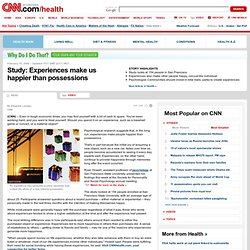
You've been working hard, and you want to treat yourself. Should you spend it on an experience, such as a baseball game or concert, or a material object? An experience may generate positive memories that outlast the allure of a new material possession. Psychological research suggests that, in the long run, experiences make people happier than possessions. That's in part because the initial joy of acquiring a new object, such as a new car, fades over time as people become accustomed to seeing it every day, experts said. Ryan Howell, assistant professor of psychology at San Francisco State University, presented his findings this week at the Society for Personality and Social Psychology annual meeting.
Watch for more on the study » The study looked at 154 people enrolled at San Francisco State University, with an average age of about 25. All About Psychology. How Ottawa’s Shopify is redefining e-commerce for the world - Cantech Letter. It’s been a long journey from Tobias Lütke (pictured) and Harley Finkelstein’s efforts to sell snowboards online in 2006, only to discover that the retail software they developed to sell merchandise on their own website was a better product than the snowboards themselves.
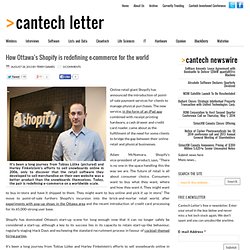
Today, the pair is redefining e-commerce on a worldwide scale. Online retail giant Shopify has announced the introduction of point-of-sale payment services for clients to manage physical purchases. The new service, in the form of an iPad app combined with receipt printing hardware, a cash drawer and credit card reader, came about as the fulfillment of the need for some clients to bridge the gap between their online retail and physical businesses. Don't give away your ZIP code to retailers. Sell it! Forbes Magazine is running a new article headlined Never Give Stores Your ZIP Code.
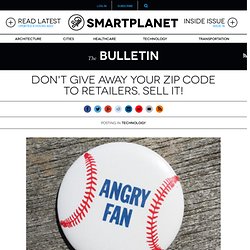
Here's Why. It reveals that retailers that ask for your ZIP code ("postcode" to some of you) use the number to build up a bigger profile of who you are and where you live. The editor might as well have just called the article D'oh! A retailer is grabbing personal details from you to construct a more thorough picture for targeted marketing purposes? Never Give Stores Your ZIP Code. Here's Why. Internet shopping remains king as mobile device dependency expands. Online sales are steadily gaining traction and overtaking the traditional crush in brick-and-mortar shopping centers, research says.
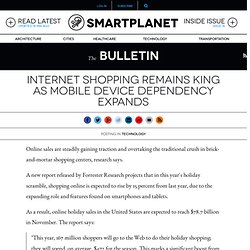
A new report released by Forrester Research projects that in this year's holiday scramble, shopping online is expected to rise by 15 percent from last year, due to the expanding role and features found on smartphones and tablets. As a result, online holiday sales in the United States are expected to reach $78.7 billion in November. The report says: "This year, 167 million shoppers will go to the Web to do their holiday shopping; they will spend, on average, $472 for the season. This marks a significant boost from the average spend of $419 in 2012 -- and accounts for 12 percent of the total growth projected for the season. " The rise in mobile computing is said to be the root cause of the change in consumer spending habits. Trusted brands can obtain troves of consumer data. Boston Consulting Group (BCG) today published the results of a survey on "big data" that highlights how trusted brands obtain the most information about their consumers.
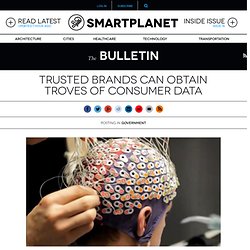
BCG took a sample of 10,000 people globally throughout developed and emerging economies. Its key finding was that trust matters about all else: companies that inspire consumer confidence can obtain 5 to 10 times more data than the baseline. Data can and often does mean the difference between profitability or flat sales.
Consumers worldwide guard their financial and health data, but are less concerned about sharing basic demographics or product preferences. U.S. consumers are selective when they share data. Other findings were that Millennials, a generation that grew up with the Web, are almost as concerned about their privacy as older adults. Companies that want to obtain more consumer data should focus on building trust. Other surveys have had similar findings about consumer behavior. (image credit: EPFL, ZDNET) Best 7 Videos about the Future of Retail.
Are we ready for a robotic barista? Humans have proven to be highly adaptable when it comes to replacing personal service with that of a computer.

We survive without a ticket agent at the airport, a cashier at the grocery store and a teller at the bank. There are kiosks that identify us by our palms, check out our library books and even make pizza with customized toppings. But what happens when a machine displaces someone we really care about -- someone who knows our personal routines, remembers our quirky tastes and sometimes talks to us before anyone else in the morning? The future of retail: personalized shopping? The online experience has evolved over the years to become more personalized.
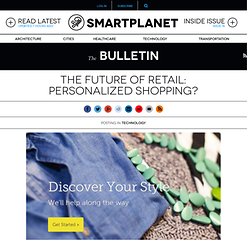
Everything from Pandora picking out new music for you based on the artists you like to advertisements that predict your interests based on browsing history. And while online retailers use similar personalization techniques to suggest products based on your purchase history, new retailers are taking that concept to the next level.